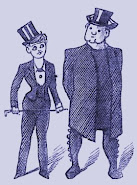 |
Frank Bellew – Research, 1859
|
Memories Speak Volumes, and
Vice Versa.
By Rick Marschall.
I think it is plausible that sensors, or synapses, or
microscopic engineers in the brain do work that we will never understand. How
and why we dream, often in complicated scenarios, I will never understand.
There are a lot of things I do not understand, but I think science will never
solve this one.
The brain is a muscle, I have heard, and that became
apparent to me about a decade ago when I wrote three books, two of them with
elaborate research and footnotes; three very long magazine articles; my weekly
blog; and much else I eventually computed at about 400,000 words for the year,
all while being caregiver for my wife. The “brain is a muscle” theory was
brought home when I was fairly insensate for a couple months afterward. (You
can save your electrons if you are tempted to write in with questions like “How
could you tell?” because I was the first to address that…!)
But like dreams, there is another question whose answer
seems obvious, yet still ultimately elusive. It is confirmed uncountable times
in our lives – how do smells trigger memories, even visual images, in
our minds? I know that olfactory nerves from our sneezers connect to the brain,
sure; that’s how we know something caught fire in the kitchen. But how is it
that… well, here is one example:
As a young cartoon fan, I first discovered Puck
Magazine, individual issues, when I was in second grade. My father visited Book
Store Row in Manhattan on many weekends, and I invariably accompanied him. That
neighborhood, now more a memory than anything else, was several blocks south of
Union Square Park, its epicenter roughly 14th Street and Fourth
Avenue. There were even maps of the approximately 125 used-bookstores clustered
in the area.
A store called “Memory Shop,” whose owner was the
perpetually knowledgeable but slightly dazed Marc Nadel (I think the spellings
are correct), was a sort of heaven-on-earth to this young fan. Its specialty
was what we would call today “popular culture” – movies, comics, cartoon books,
Broadway memorabilia. It was at the top of rickety stairs in a nondescript
building – now probably a parking garage – opening to a large room messily
overflowing with cases and boxes and piles of… everything from sheet music to
bound volumes. Marc had a gargantuan movie poster of Rudolph Valentino in Son
of the Sheik, too large for any wall. So it was tacked to the ceiling,
covering almost all of it, kind of a pop-culture worshiper’s Sistine Chapel.
One bookcase had several volumes of Puck Magazine
from the 1880s. Magic to me. Gigantic they seemed to a fifth grader. I was
already hooked on vintage comics and cartoons from books my dad had, like
Coulton Waugh’s The Comics. And I was already devoted to F. Opper, still
my favorite cartoonist. Years before Happy Hooligan, he drew political
and gag cartoons for Puck. The 1889 volume was my first purchase at The
Memory Shop.
Marc held the rest until income from my paper route
enabled me to buy the next and next volumes at the heady price of $25 each. I
have never maintained much of a savings account since then, proving the adage
that “the child is father to the man.”
Those summer nights, when I acquired that bound volume,
are as fresh to me as yesterday. I had already purchased loose issues of Puck,
Judge, and Life along Book Store Row, but there was something
impressive about an oversized volume, hundreds of pages of vintage cartoons,
many colored in lithographed glory, terrific artwork by unknown names who
eventually became closer friends of mine than schoolmates.
But those olfactory nerves! The paper in that volume was
quality, not pulp. They were not fragile nor yellowing nor slowly degrading.
Yet they gave off an aroma – a fragrance I would call it – that was
distinctive. And today, about 60 years later, when I pull that 1889 volume off
the shelf, and I smell that certain aroma anew… it is not new. Not only do I
recognize it, but I have a mental image of myself at 10, sitting on the sofa in
the enclosed porch my father had built that year. A portable TV was on, but I
ignore it as I discover and rediscover those pages of Puck and my new
friends Opper and Keppler and C J Taylor and Ehrhart and Dalrymple and Syd B Griffin.
Since then I have appreciated bound volumes more than
individual issues of newspapers and magazines, and I am like the old fellow in
an old cartoon. I believe it was drawn in 1859 or 1860 by Frank Bellew, one of
the real pioneers of his craft. He was probably the most prolific cartoonist of
his day. “Probably” is not in play – his signature, often enclosed in a little
triangle, shows up in countless journals, from the famed Harper’s Weekly
to obscure almanacs.
This is one, likely by him but oddly unsigned. I
discovered this about the time when I scored that volume of Puck. Except
for the bald head and wizened features, that devotee was me. Joined at the hip
to an old bound volume; reading it at every moment; executing a bibliomaniac’s
calisthenics to read it. Discovering things on every page. And savoring the sort
of perfume that only collectors of Yesterday’s Paper can perceive and love.
– 30 –
68












No comments:
Post a Comment